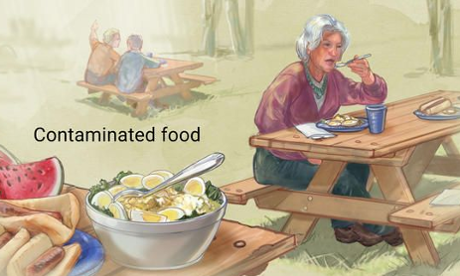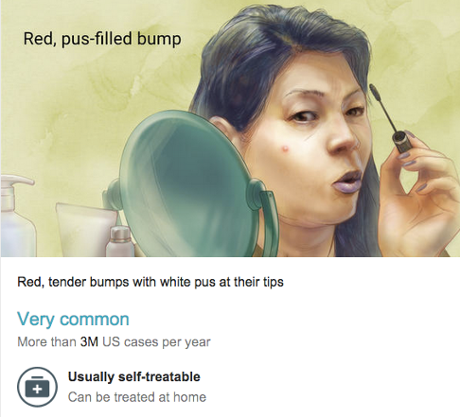At 11am I had a strange pain in my toe. By 11.03 I’d decided I had gout. By 11.05 I was convinced it was a brain tumour. By 11.15 I’d realised that, actually, my shoes were probably to blame, but by that time I’d already decided on the music that should be played at my funeral.
You may think I sound crazy but, actually, I just have a mild form of cyberchondria: a condition in which benign aches and pains are transformed into fatal diseases after a few minutes spent looking up symptoms on Google. It’s a common ailment: one in 20 Google searches are health-related and, according to a 2012 study, one in four British women have misdiagnosed themselves on the internet. Google is well aware that it is now most people’s primary healthcare provider and has started to better monetise, sorry, I mean “manage”, how we access medical information online. On Tuesday, the search engine announced that, when you ask Google about common health conditions, you will be provided with the most relevant medical information immediately, through the knowledge graph, so you don’t have to trawl through heaps of websites. This new data is currently only available in the US but will eventually be rolled out globally.
The knowledge graph is, more accurately, an answers rectangle; it’s that box that sometimes comes up alongside your search results with time-saving information about whatever you were looking for. Basically, it’s Google’s ploy to keep you from leaving its clutches and clicking on links to other sites. By some reports (Wikipedia’s), the knowledge graph has played a role in the pageview decline of various language versions of Wikipedia.
The fact that Google is injecting medical information into the knowledge graph is, generally speaking, a positive thing. It means you can be more certain the medical information you’re accessing is accurate. An average of 11 doctors have vetted Google’s medical facts; each of the 400 medical conditions currently listed was then reviewed by non-profit healthcare organisation the Mayo Clinic.
But Google’s medical intervention isn’t without serious side-effects. First, it gives Google even more control over the information we consume every day. Second, by making it easier to research medical conditions, this new function is basically crack for the worried well. Indeed, it’s possible that, by now, you are starting to remember that your toe hurts, or you have a headache, or your leg is twitching. You may feel an urge to Google your symptoms. Please proceed with caution. In order to help you bypass some of the many perils of self-diagnosis, here is a hypochondriac’s guide to Google:
Don’t take the illustrations literally

Google’s diagnoses come with medical illustrations that look like they belong in a children’s book of cautionary tales from the 1950s. While it would be weird if Google told you about diseases via animated gifs, the terrifying realism of these drawings may induce irrational phobias. For example, the illustration for “food poisoning” shows an old lady eating egg salad alone in a park. Next thing you know, she is clutching her belly in pain in a beige bathroom. All I gleaned from this before I quickly clicked away was “egg salad will kill you”.
Google knows very little about pimples

The medical illustration for “pimple” shows a woman frozen in the act of applying mascara as she eyes a big red pimple with a mix of horror and grudging admiration. The woman has purple lipstick and a cartilage piercing and probably sleeps in her makeup after coming home drunk, which is why she has pimples. She is clearly thinking: should I pop it, should I pop it? Google has nothing to say about this very important question. Instead, it recommends Neutrogena. I recommend bypassing Google for such queries and consulting Dr Zoella instead.
Quizzes are not a diagnostic tool
Sometimes, Google’s knowledge graph just doesn’t have the answer and you will be tempted to click through to a diagnostic quiz. Online quizzes are a great way to find out which Disney princess you are (I’m Pocahontas) but they are not such a great way to find out if you are suffering from Asperger syndrome.
Never Google Image dracunculus medinensis
I’m still having nightmares.
Finally, always consult your doctor
Google’s medical information may be more accurate than other information you’ll find online, but you should still take everything you read on the internet with a grain of salt. But not too much salt, of course. That will give you high blood pressure.
guardian.co.uk © Guardian News & Media Limited 2010
Published via the Guardian News Feed plugin for WordPress.
Googled your cough? Is death now upon you? Then read this article












0 comments:
Post a Comment